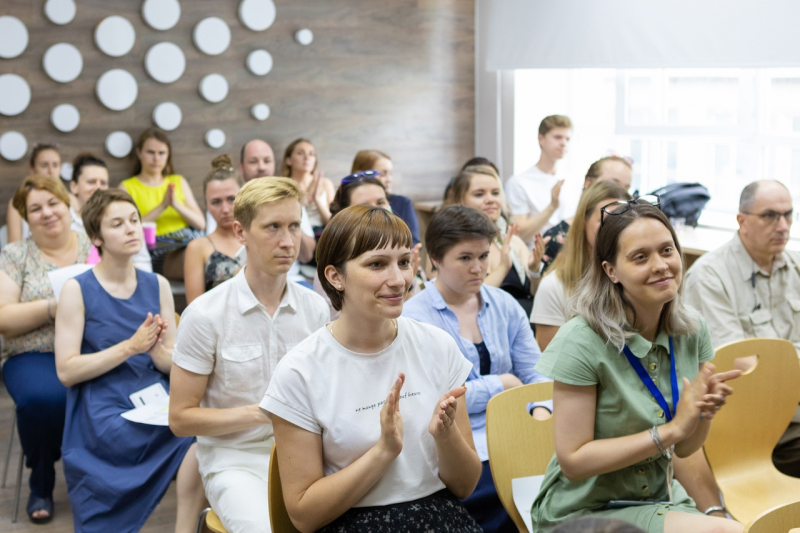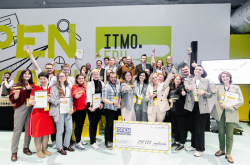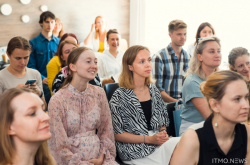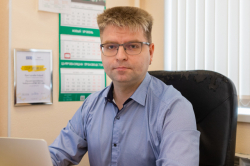Over the past academic year, ITMO.Expert has undergone a serious transformation with a change in the general style of the project and the merge of ITMO.Distant and ITMO.Expert into one platform. About 50 onsite and online events with over 60 speakers were held over the year, while the first online intensive course of the academic year brought together over 300 people. Moreover, the ITMO.Expert team together with the Faculty Support Office ran a contest for achievements in higher education for the best lecturers in two tracks – ITMO.EduStars and ITMO.EduLeaders. 37 lecturers and three mentors were awarded at the final ceremony.
At the final event of this year’s ITMO.Expert project, the participants discussed the initiatives of the 2020/2021 academic year and awarded professional training certificates to those lecturers who attended over 10 workshops, including their participation as expert speakers.
“We are happy to see the familiar faces of our ITMO.Expert speakers awarded at various competitions, both at ITMO and elsewhere. We are also glad to welcome new members to the ITMO.Expert community,” says Aliya Bagautdinova, head of the Department of Academic Affairs.
Next year, the ITMO.Expert project will feature module courses, each on its own separate topic. Moreover, this September will mark the start of the School of Young Lecturers, where every educator, including those only joining the ITMO University team, will be able to learn more about ITMO’s values, as well as the features and opportunities of academic activity at the university. Furthermore, the program will feature open modules tailored to the lecturers’ demands. They will include such topics as mental health for educators, soft skills, trends in education, and activities in virtual labs.
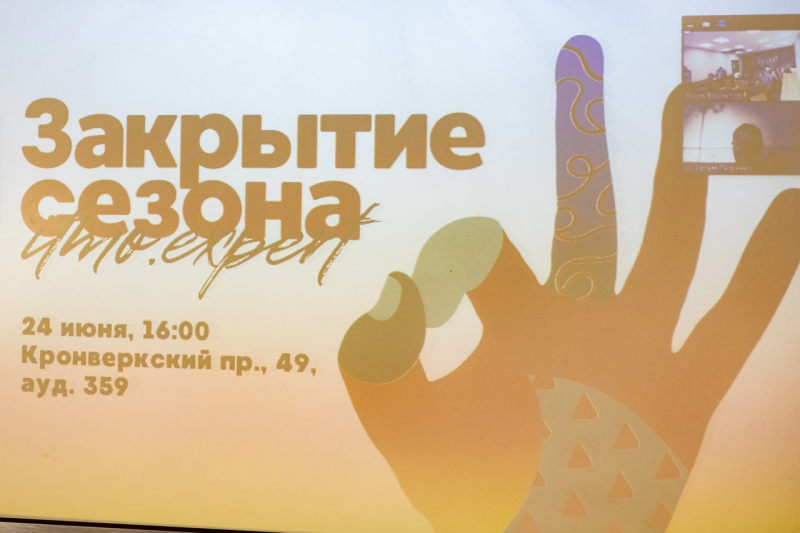
ITMO.Expert closing ceremony
Participants also mused on the role of educators in the modern world. Irina Timofeeva, a lecturer at the Faculty of Energy and Ecotechnology and winner of ITMO.EduStars, shared her approach to teaching. According to her, a lecturer’s mission is “becoming a current in the ocean of information to take students to their desired destinations.” Apart from that, lecturers need to engage students in their subjects using as many methods, materials, interactive classes, useful links, and lists of recommended resources as possible so that each student can find something that interests them the most.
Artem Petrenko, junior researcher at the Laboratory of Single-Photon Detectors and Generators and one of the mentors awarded this year, spoke about maximizing the efficiency of the mentor-lecturer collaboration and the benefits offered by such maximization.
ITMO.NEWS asked the participants about the qualities of an educator in 2021, the battle for students’ attention, and the race against the internet as the primary source of knowledge about anything.
Irina Timofeeva, a lecturer at the Faculty of Energy and Ecotechnology
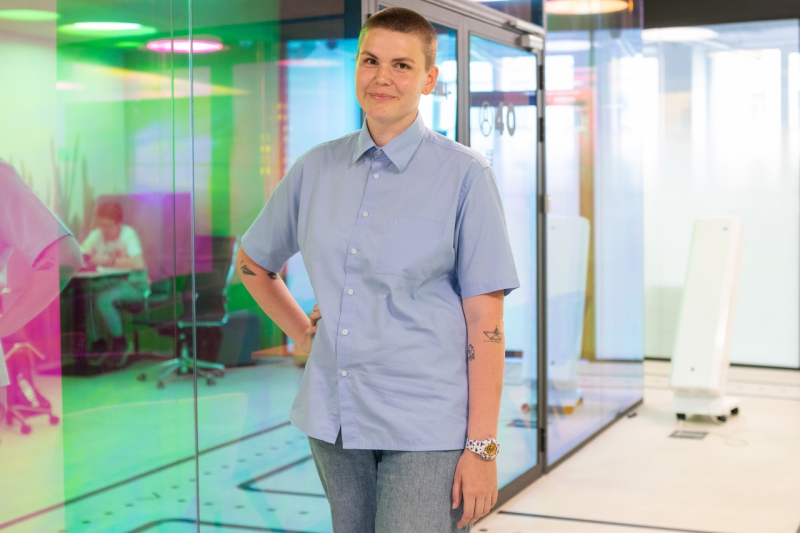
Irina Timofeeva
From my own time as a student I remember the kind of lecturers that I liked. They were professionals in their own fields – who could also present information in an engaging way.
I think that these days the main task of a lecturer is securing the interest of students in their subject. It’s kind of like educational marketing: you have to sell your subject at the highest possible price evaluated in the currency of students’ attention, respect, and love. I am certain that any usual lecture can be made interesting if you add your personal touch to it in the form of real-life examples or stories. Personally, I try to be honest with my students and share my experience. Before becoming a lecturer at ITMO, I did many different things and travelled a lot – that’s why I can think of an interesting story for any situation. At the same time, we have to teach our students to think critically and evaluate the information they receive to decide what to believe.
For core modules, such as Ecology, I have lists of popsci books and films to offer my students. One of the tasks I give is to choose something from the list – which features everything from The Simpsons to serious scientific papers, – read it, and write an essay. Students usually like this task and some of them say in their feedback forms that they’ve read and watched half of the list and are thrilled with it.
Anton Starovoytov, associate professor at the Faculty of Photonics
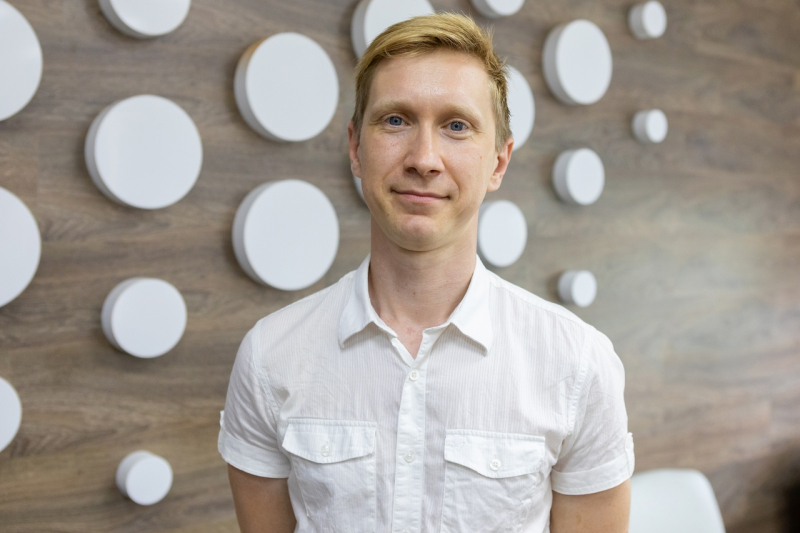
Anton Starovoytov
In my opinion, there are not so many changes in the mission of an educator – only the tools have changed. The mission is primarily in bringing students through the complexities of scientific literature and sharing the knowledge and competencies you have as a professional.
Before, we pictured classic lecturers in front of a blackboard. Now, however, there is a wide variety of digital mechanisms not only for lectures but also for student engagement and more interactive classes. Classes become more diverse, interesting, and innovative.
Lecturers are essentially guides. You can surely find a lot of information online, but the quality of this information can be questionable. Students who don’t have the necessary competencies nor practice critical thinking can find it hard to tell what’s true and what’s not. As a lecturer in a research-oriented Master’s program, I see that researchers have different opinions on some physical phenomena – and thus you start to wonder where the truth is. Actually, it is somewhere in the middle and as lecturers we have to show all of these different opinions and guide our students on the paths towards their own solutions.
Konstantin Pravdin, associate professor at the Faculty of Control Systems and Robotics, lecturer at ITMO’s Mathematics Educational Center
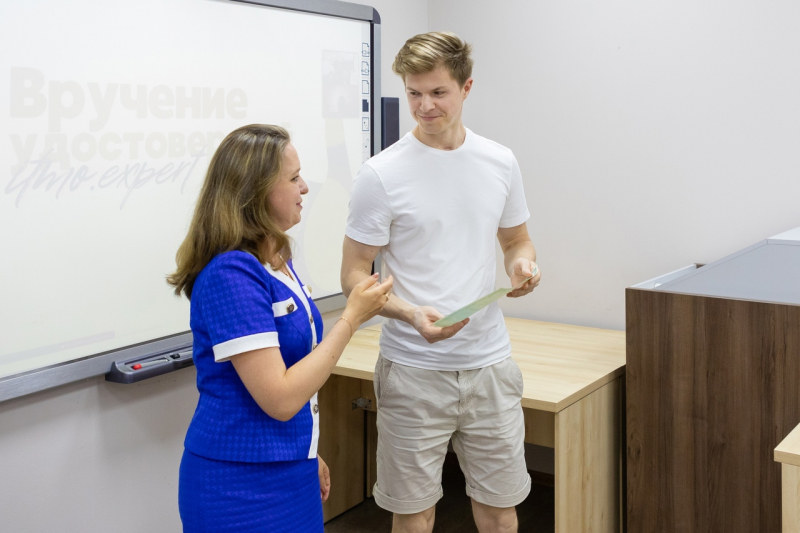
Aliya Bagautdinova and Konstantin Pravdin
I’ve been teaching since 2011, but my ten years worth of experience does not mean that I know all there is to know about the job. I think the key here is in mastering new technologies, approaches, and methods, as well as learning from your colleagues – instead of repeating the lectures you had yourself or teaching the way that only seems to be appropriate. When you share practices with your colleagues or learn something new, you get the motivation to experiment and try new things, and without it you won’t grow as a lecturer.
I could notice the changes already when I started at the job: digitalization was in full swing, internet technologies were developing, new resources and sources of information kept entering our lives. There were more and more websites and then videos or mini online courses explaining complicated topics in an accessible and playful way. In such an environment, lecturers evolved from being sources of knowledge to some kind of mentors or consultants that guide students. I really liked the “current in the ocean of information” analogy drawn by Irina Timofeeva.
As for the race for students’ attention, truth be told, you always had to make a joke or go the extra mile to grasp students’ interest, it’s just that now this question is more acute. But I think it’s crucial here to not go overboard with fun. I experiment with different formats at my lectures and I notice that students have a tendency to slip to one side of the spectrum. Sometimes they are so immersed in the game that they forget the subject itself. So we have to find a balance between these states and set tasks that are fun, creative, and yet informative.
Daria Shatokhina, assistant at the Faculty of Technological Management and Innovations for the Master’s program in Innovative Marketing
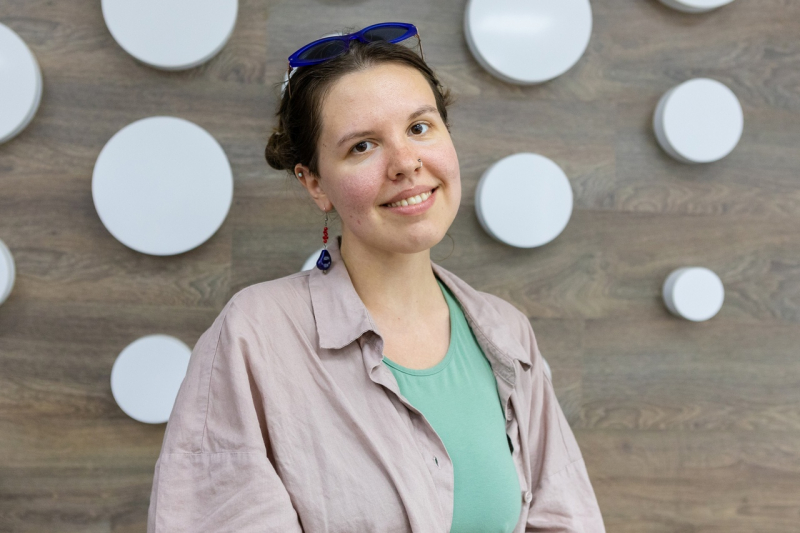
Daria Shatokhina
Next year, I will become a lecturer but now I am an assistant and I hold classes in branding, communication, and marketing studies.
In partnership with ITMO.Expert my colleagues and I taught the Personal Branding for Educators course. Over four classes, we analyzed the essential qualities of modern educators and their changing roles and functions, as well as ways they can present themselves and build their personal brands based on their core values.
During these classes, we held a foresight session where our participants discussed how trends and present or possible changes can affect the role of a lecturer. Among the key qualities that we’d identified were flexibility, the drive for self-development and openness to new things, as well as the need to be the guide towards new values aimed at respect for individuality and interest in new knowledge. Moreover, during the course we found that to be a lecturer requires one to be open and available, they have to be able to talk about themselves, and to build rapport with their students.
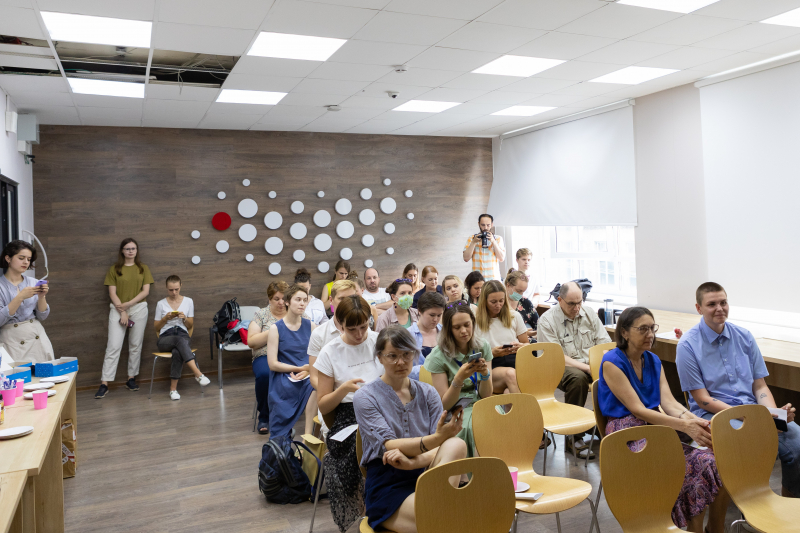
ITMO.Expert closing ceremony
Before launching the course, we ran a survey among 70 Bachelor’s and Master’s students. They maintained that lecturers have to be understanding, speak on equal terms with students, and be respectful. Students also value it when their lecturers explain the subject in an accessible way and are approachable with questions, not intimidating. Among the important qualities mentioned was also a sense of humor, as well as an interest in popular culture – music, films, books, etc.
At the end of the closing event, the organizers announced the next intensive online course for ITMO University lecturers to be held on August 23-27.
“We are happy to say that the online course is becoming our tradition at the start of each academic year. At this event, our lecturers can get answers to burning questions about the coming changes in the educational process, the ways to efficiently adapt their courses to the module format, plan their professional development, or keep students motivated, as well as get an overview of the most efficient tools and technologies for education. Over this week, we will offer our lecturers an intensive program with creative projects and many digital tools. As usual, participants will be able to join from anywhere and choose their own personal track at the course. See you on August 23!” concluded Olga Eliseeva, head of the Department of Educational Quality Assurance.
